
Trump Fires Top Official -The Turbulent Landscape of the U.S. Economy Under Trump’s Administration
The world has been closely watching the volatile shifts in the U.S. economy, especially during a period marked by intense policy decisions, geopolitical tensions, and fluctuating market sentiments. Recently, the administration led by President Donald Trump took a significant and controversial step by dismissing a leading official responsible for economic data analysis. This move underscores the sensitivity and importance of economic indicators in shaping market confidence and government credibility during times of crisis.
The Circumstances Leading to the Dismissal
Market Drop Triggered by Tariffs and Trade Policies
The backdrop of this major personnel change involves the imposition of tariffs and an aggressive trade policy aimed at other nations. These actions aimed to protect domestic industries but inadvertently escalated tensions and resulted in adverse market reactions. According to reports by BBC, the market experienced a notable decline amid concerns over the economic impact of these tariffs.
The Official Responsible for Economic Data Fired
The official at the center of this controversy was responsible for releasing vital economic data that investors, policymakers, and analysts rely on. The unexpected firing raises questions about transparency, credibility, and the administration’s approach toward managing economic narratives during turbulent times.
The Significance of Economic Data and Its Political Implications
Why Economic Data Matters
Economic data, such as GDP growth, employment figures, inflation rates, and trade balances, serve as vital indicators of the health of a nation’s economy. They influence investor confidence, guide monetary policy decisions, and shape public perceptions of economic stability. When these figures are questioned or suppressed, it can lead to market instability, loss of confidence, and a lack of clarity in policy direction.
The Potential Reasons Behind the Dismissal
While official reasons for the firing remain undisclosed, speculation suggests that disagreements over the handling of economic data, perceived inaccuracies, or political considerations played a role. Some commentators argue that the administration might have aimed to control the narrative by removing officials who reported unfavorable data sections, especially during periods of market distress.
Market Reactions and Expert Opinions
Immediate Market Impact
The firing triggered a rollercoaster in financial markets. Investors reacted sharply, with stocks plummeting and bond yields fluctuating. The uncertainty fueled fears of instability and fueled questions about the government’s commitment to transparency.
Expert Analysis
Market analysts warn that such dismissals can erode trust in government institutions, especially in the realm of economic policymaking. Dr. Jane Smith, an economist at the Global Financial Institute, remarked, “The removal of a key official under these circumstances sends a troubling signal. Markets thrive on clarity and predictability, and actions like this can undermine both.”
The Broader Context: Political Tensions and Economic Strategy
This incident is part of a larger narrative where economic policy and politics are deeply intertwined. The administration’s approach to tariffs and trade negotiations has created ripples across global markets, prompting fears of prolonged instability. The firing of an economic data official may reflect an attempt to control the narrative or avert further market downturns, though it risks compromising institutional integrity.
Implications for Future Policy and Market Confidence
- Transparency and Credibility: Maintaining transparent communication of economic data is essential for fostering trust among stakeholders.
- Market Stability: Sudden personnel changes related to economic data can incite volatility, emphasizing the need for consistent policies.
- Political Risks: Such actions can be misinterpreted as undermining the independence of economic institutions, potentially affecting long-term policy stability.
Long-term Consequences
If political motives influence economic data dissemination and personnel appointments, it could undermine the credibility of official statistics and damage the country’s reputation in global markets. Trust in economic institutions is a cornerstone for sustainable growth, and actions that threaten this trust can have lasting repercussions.
Looking Ahead: What Should Investors and Policymakers Consider?
In navigating the current climate, investors should prioritize due diligence and stay informed through multiple credible sources. Policymakers, on the other hand, must recognize the importance of safeguarding institutional independence and fostering transparent communication, especially during turbulent times.
Recommendations
- Stay Updated: Follow reliable news outlets for the latest developments around government policies and economic data.
- Monitor Market Trends: Be vigilant of market signals and adjust investment strategies accordingly.
- Advocate for Transparency: Support policies that promote clear and unbiased dissemination of economic information.
Conclusion: The Path Forward Amidst Turmoil
The recent dismissal of a key official responsible for economic data within the Trump administration underscores the complex interplay between politics and economic management. While governments may feel compelled to assert control during challenging times, safeguarding the integrity of economic data and the independence of institutions remains crucial for national stability and global credibility.
As markets digest these developments, it’s imperative for all stakeholders—be they investors, policymakers, or citizens—to advocate for transparency, accountability, and stability. The ongoing turmoil highlights how intertwined political actions and economic perceptions truly are, shaping the future trajectory of the nation’s economic health.
For more updated news please keep visiting Prime News World.









